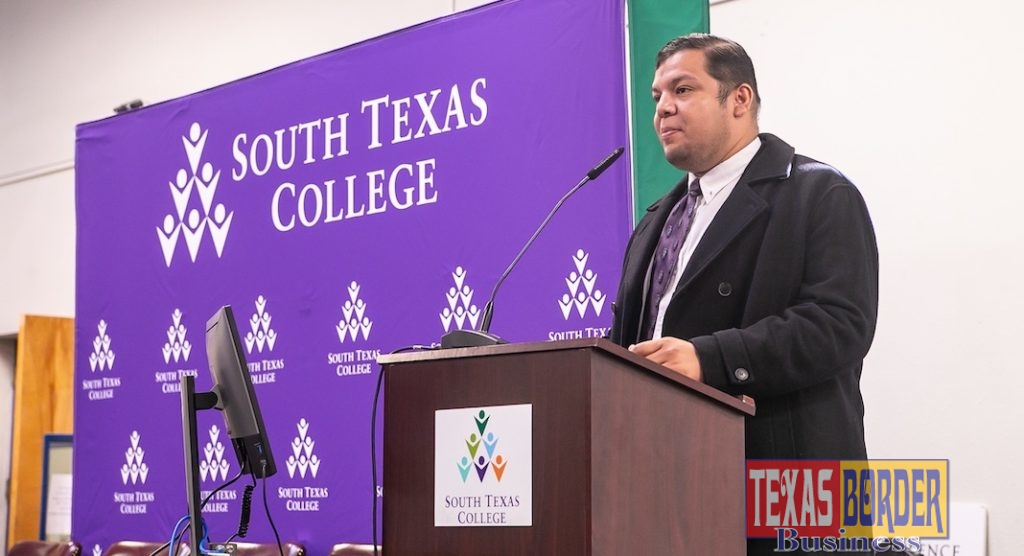NAFTA 2.0 and manufacturing front and center at annual Innovation Conference

Texas Border Business
MCALLEN, TEXAS – South Texas College is a conduit for economic growth which provides a crucial productivity component for the workforce, according to economists with the Federal Reserve who spoke at STC’s 7th Annual Binational Innovation Conference (INNO) Nov. 1.
The theme for the event “A New Era of Manufacturing in South Texas and Northern Mexico” welcomed the brightest minds in industry, education, and economic development, who each brought pertinent information focused on innovation and the impact of students on the future workforce.
This year’s conference was centered primarily on the proposed agreement between the United States, Mexico, and Canada to modernize the 24-year-old North American Free Trade Agreement (NAFTA) into a 21st century, high-standard agreement.
The USMCA was signed by United States President Donald Trump, Mexican President Enrique Peña Nieto, and Canadian Prime Minister Justin Trudeau on Nov. 30, 2018, at the G20 Summit in Buenos Aires. As of November 2019, the pact is still pending the United States and Canada legislatures ratifying the agreement. Mexico ratified the USMCA in June 2019.
The new United States-Mexico-Canada Agreement (USMCA) aims to support mutually beneficial trade leading to freer markets, fairer trade, and robust economic growth in North America, according to the Executive Office of the President of the United States.
“We really want to emphasize the binational aspect of this event, which has always been the original mandate of the annual conference,” said Jose Olivares, an economics lecturer at STC and a coordinator for this year’s INNO conference.
At this year’s conference we focused on manufacturing due to our growing industry and also focus on trade with the new USMCA,” Olivares said. “These two topics cover a lot of ground when trying to gauge those factors that really affect the entire border in terms of jobs and job creation.”
Notable speakers at the event included Blake Hastings, an economist with the Federal Reserve Bank of Dallas, who gave an economic overview of the South Texas region including the Rio Grande Valley.
Jose Espinosa Alvarez, an instructor at Universidad Autonoma de Tamaulipas, spoke on the manufacturing industry in Mexico. Dr. Salvador Contreras, associate professor of economics and director of the Center for Border Economic Studies at the University of Texas Rio Grande Valley, offered his presentation on the USMCA “NAFTA 2.0” to attendees.
An afternoon panel discussion with economic experts included Salvador Dominguez, regional manager with Emerson Electric; international trade consultant and licensed customs broker Adrian Gonzalez; Jose Luis Suarez Vera, an instructor at Universidad Autonoma de Tamaulipas; and Jorge Kuri, general manager for Trostel Ltd.’s plant in Reynosa.
“There are two things that grow the economy – growth in the workforce and growth in the productivity of the workforce,” Hastings told attendees at the conference. “You here at South Texas College are working on the productivity part of the workforce, giving those students who come here the skills to be competitive so business and industry can be more productive.”
The conference brought together experts from both sides of the border to analyze changes contained in the USMCA, their likely impact, and how best to prepare for them.
Conference sessions also addressed new rules and norms affecting manufacturing, supply-chain formation and continuity, binational trade and border commerce, foreign direct investment, and general regional economic growth and development, according to economists at STC.
“From the perspective of local business, we wanted to bring experts from both sides of the border to discuss the various elements of manufacturing because the new treaty will create changes to the rules,” said Teo Sepulveda. “We want everyone in our region to be informed about these changes as well as the future economic outlook for employment and development.
“Students, as well as businesses, have to be ready for what’s coming,” Sepulveda said. “We want everyone to be ready and able to manage these changes including the new rules as well as the technology we see up ahead.”














